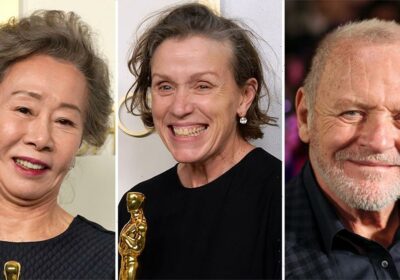Oscars Were A Big Win For Older Actors; Most Inclusive Ever

Sunday night’s Oscars were the most inclusive ever in terms of one of Hollywood’s most overlooked areas of discrimination – ageism against older actors.
At 83, Anthony Hopkins was the oldest ever to win for Best Actor; Frances McDormand, at 63, was the third oldest to win for Best Actress, and Youn Yuh-jung, at 73, was the third oldest to win for Best Supporting Actress. In two of the acting categories, the Oscar was awarded to the oldest nominees – Hopkins and McDormand. Youn, who is three months younger than fellow nominee Glenn Close, was the second-oldest in her category.
Four years ago, a report from the USC Annenberg School of Communication and Journalism found that characters ages 60 and over “are scarce in Best Picture-nominated movies” and that senior women and older minority characters are even more rare. It also found that there were only two leading characters over 60 featured in all of the 25 Best Picture Oscar-nominated films in the previous three years, and they were both played by the same actor: Michael Keaton. “What seems to be apparent from this investigation is that despite all the discussion about inclusion in Hollywood, seniors are left out of that conversation,” said Dr. Stacy Smith, one of the report’s co-authors.
#OscarsSoYoung? Report Finds Ageism in Oscar-Nominated Films
“Let me put this frankly: ageism is the bias that is typically ignored in the passionate campaign to end racism, sexism, and all forms of discrimination. But not ageism,” said Lee Purcell, chair of the Seasoned Performers Committee at the L.A. Local of SAG-AFTRA, during a panel discussion on ageism earlier this month. “People scream about the need to be represented in film and television – what is referred to as the American scene. Yet people over 60 are both underrepresented and misrepresented, even though we are over 20% of the U.S. population and rapidly growing. In ten years, seniors will outnumber 18-and-unders. Remember this, the one category that everybody will end up in, if they’re fortunate, is the over-60 category.”
The Annenberg School, she noted, “has done two eye-popping recent studies, appropriately titled ‘Still Rare, Still Ridiculed,’ on the dire lack of inclusion of seasoned performers in film and television, which tell us clearly that seasoned performers are almost invisible in film and television. And when we do appear, we’re often misrepresented and ridiculed.”
The report found that in the top 100-grossing films of 2016, out of the 4,288 speaking or named characters with a discernible age, only 10.7% were 60 years of age or older. “This means as seasoned performers we don’t have work opportunities,” Purcell said. “And combining ageism with sexism, only 26.4% of all over 60-characters were female, while 73.6% were male, even though women comprise a larger percentage of the U.S. population than men. And 39 of the 100 movies analyzed by the Annenberg study did not portray a single female over 60 as a speaking character.”
A separate USC study found that the same was true in television; that of the 1,609 speaking characters surveyed on shows that aired between June 1, 2016, and May 31, 2017, only 9.4% were aged 60 and above.
Jackie Joseph, co-chair of SAG-AFTRA’s national Seniors Committee, said that “what is clear to our committee and myself is that we really need a major campaign, a big loud campaign to put the spotlight of senior issues. We know the issues. We’ve talked about them for years. But it is really time for action, right now.”
Said Purcell: “I agree with Jackie. We need to wake up people with a major campaign; a commitment to storm the barricades to make real and lasting change to the last accepted bias – ageism.”
Read More About:
Source: Read Full Article